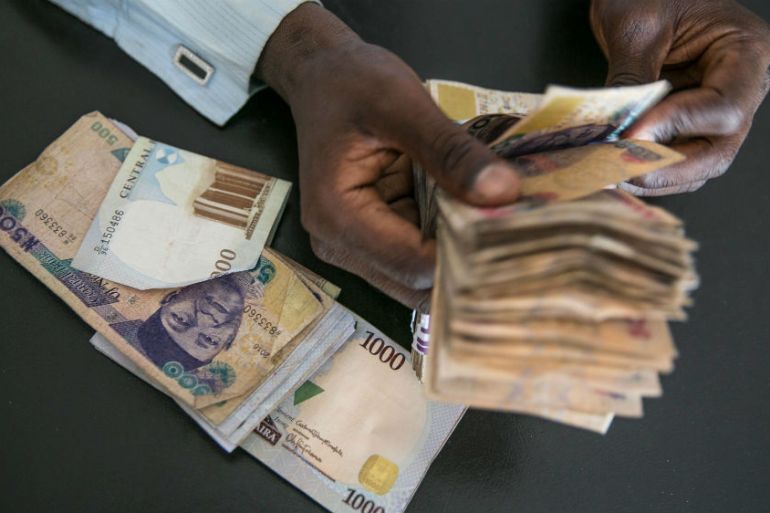For Nigeria, it’s 2015 all over again
Pressure is again building on the naira, Nigeria’s currency.

Faced with the prospect of a weakening naira, the Central Bank of Nigeria is digging out its 2015 playbook to stem the currency’s decline. After losing out then, traders are betting on history to repeat itself.
Four years ago, Governor Godwin Emefiele curbed dollar supplies for imports on 41 products from glass to toothpicks. Now, he wants dairy on the list, while President Muhammadu Buhari wants to add food. It’s a last-gasp bid to avoid marking down the naira for the third time since February 2015, when the currency was pegged for 15 months against the dollar. Forward rates suggests it won’t work, predicting the naira will weaken 11% to 405.06 by the end of June.
Keep reading
list of 4 itemsRussia’s Putin eyes greater support from China for Ukraine war effort
India-Iran port deal: A gateway to Central Asia or a geostrategic headache?
India’s income inequality widens, should wealth be redistributed?
“The governor himself knows he is going to starve if he implements the directive,” said Michael Famoroti, an economist and partner at Stears Business in Lagos. “I am unsure what exactly the central bank is going to do.”
While the central bank wants to boost local food production, there are other reasons for the urgency. Africa’s largest oil producer has a record 9.6 trillion naira ($27 billion) of government securities that have to be repaid by the end of December. The country’s current account, the widest measure of the trade in goods and services, swung to a deficit in the first quarter, while the price of crude, which generates 90% of Nigeria’s foreign exchange, has dipped below the $60 level that the state’s budget is based on.
But curbing greenbacks at the height of the 2015 currency crisis and in the face of tumbling oil prices came at a cost. The measures drained Nigeria’s reserves from almost $50 billion in 2013 to below $24 billion in October 2016.
It also pushed the inflation rate to an almost 12-year high because it limited supplies, contributing to the economy’s first full-year contraction in a quarter century, a slump it’s still struggling to recover from. Inflation has held above the central bank’s upper target of 9% since June 2015.
“Effectively banning the import of all remaining food items would have grave consequences for the availability and prices of certain food products and add to prevailing inflationary pressures,” said Malte Liewerscheidt, an analyst at Teneo Intelligence in London.
Over the past three years, authorities have relied heavily on open-market operations, in which government securities are sold at special auctions to control the amount of money in the financial system. These so-called OMO notes created a lucrative carry trade for foreign investors with yields on 175-day notes of 11.8%, compared with 11.35% on 182-day Treasury bills, making them more costly.
While reserves of $44 billion are greater than 2015, these have declined consistently since May, and outflows from repaying maturing OMO notes could deplete them further.
“It doesn’t have the capital to continue issuing notes as aggressively as it has in the past,” Amaka Anku, Eurasia Group’s Africa head, said by email.
Foreigners own at least $17.5 billion, or 37%, of the outstanding securities, which will test the central bank’s resolve after being so accommodative with its balance sheet, Chapel Hill Denham Securities Ltd. said in a note.
Global factors, such as the U.S.-China trade war, slowing global growth and an increase in shale oil production could further “make or mar” the central bank’s efforts to stabilize the naira, Chapel Hill Denham researchers, led by Tajudeen Ibrahim, said. Efforts to contain food imports also risk failing because of porous West African borders, which will not only have the unintended consequence of costing the government lost revenue and spur inflation, but also push demand for foreign exchange to “alternative markets,” they said.